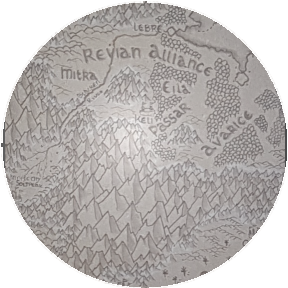
The Revian Alliance
The Revian Alliance consists of Mitra, Eila, Passar, Avarice and Lebre. The alliance has no single ruler and is really more of a trade union between the regions, and a military alliance in an effort to look stronger and more united towards the powerful Queen Llaene, in the East and their enemies of old in the North in the Baros'tir territory. Even though the alliance and its regions lies well protected by the central mountains the area has allways been heavily contested by invaders from the East or the North and even from the North Sea, the people of the Revion Alliance are a hard tested people with lots of suffering in their history. The Great Wall of Mitra itslf bears many marks of countless battless and if the river called Whispering Rapids could speak it would probably insist on being called the red river or the River of Blood. In more recent times the alliance has grown strong and the region is experienceing peace within and the borders have become less contested. If any, the capital of the Alliance is Keli where most of the trade from the regions is coordinated and gathered and where the bulk of military and civil administration is located.
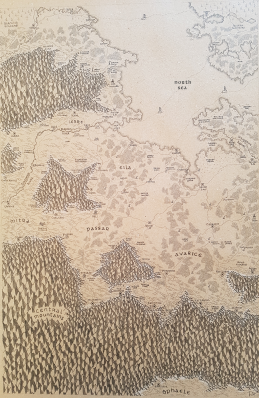
The alliance was initially formed between Passar, Avarice and Eila. The mountain region to the far west, called Mitra, was for a long time ruled by warlords and local self acclaimed rulers with no real coherency until they joined the alliance 121 years after its foundation. Mitra joined the alliance for purely pragmatic reasons because all their trade went through those regions and as of late, they saw the value in having allies in three large regions between them and Queen Llaene. The regions of Passar and Eila also have local warlords and clans to rule the regions but as most life is nomadic following the season and the flow of the forest, there isn't much need for rule in these territories. Their nomadic lifestyle also means far less claims to territory and far less conflicts over land which has kept the alliance at peace and able to keep their focus on Llaene to the east. The dwarves in Avarice are in many ways similar to the people of Mitra, but they are also on the outer edge of the alliance and closer to war and skirmishes.
Geography: To the west, in the region called Mitra, the land rises into the Central Mountains, dry, jagged and bone breaking territories that produce sturdy people, all hills and naked mountains. To the east lies huge forests with an abundance of wildlife and resources in Eila and northern Passar where the Central Mountains meet the Sabra Mountains. A land of huge contrast with the harsh and dry landscape in the west slowly changing into lush forest and rich soil in the east. The formal borders between the alliance and Queen Llaene to the east, is the river known as Whispering Rapids, a huge stream gathering most other rivers and streams before it empties into the vast North Sea. To the south Passar and Avarice stretch into the mountains, and a vast network of mines and mining cities.
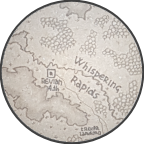
Military: The are no official borders within the Revian Alliance, the locals seam quite aware what is theirs and what belongs to their neighbours. Outwards two major borders are upheld and defended. To the North heavy fortifications and a great wall keeps the Baros'tir raiders at bay. Historically this has been a hotspot but in recent times with the alliance responding prompty to raids things have calmed considerably. The other border runs along the Whispering Rapids with Llaene Kingdoms on the other side. The Revian Alliance and the regions of Avarice and Passar in particular maintain an army of around 5000 warriors and mercenaries, 1200 horsemen, 2800 archers, 500 infantry units of varying strength plus additional logistic and warmachinery on the banks of the Whispering rapids. They maintain an additional app. 1800 infantry and horsemen in central Avarice not too far from the border, somewhat scattered between 4 garrisons, but always alert and ready to move out to reinforce or simply dissuade the Queen by displays of power, a language that she herself speaks fluently and understands quite well. The Revians know how to push to avoid getting shoveled In the North on the Baros'tir borders there is app. 200 archers and 1500 horsemen in Baros'tir Passage and forward garrisons and two to three thousand light infantry in the fort Novoudzo. How many more soldiers the Revians have in the backlands is floating and unknown. Realistic and sober men say they muster another 2000-3000 warriors, but barspeak and less sober individuals will swear that the revians have more than 10.000 standing by. When it came to their only enemy in the East, all that really mattered was displays of power, parades, military exercises and an occasional real display of power should anyone dare to cross the Whispering Rapids, keeping the kingdom guessing at the rest and the Revians had themselves a perfect tie.
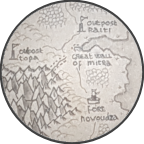
Religion: Local faiths, the only dominating faith is the Mithran Sol cult that has its origin and temples deep within the central mountains. A secret and holy place of worship that the Mithrans would defend with their lives, a place of which they never speak to outsiders or people of lesser trust.
Social: Most people from the alliance are mountain or forest folks, sturdy, hard looking people not reaching that tall, but with a bulk of muscle that speaks volumes about their hardiness. The clans from Passar and Avarice are dwarves but the clans and warlords of Mitra and Eila are not, and would take offence to word, but their sturdy frame does give them a familiar dwarven streak. The Revians aren't considered very hospitable, and most outsiders find them overall secretive and hard to read. The truth is that once you get to know them, they can be quite openhearted, not in any way bordering on dramatic or festive, yet they have their own harsh and grey version of hospitality that actually comes from a good heart, they just aren't that busy conveying it.
Trade: Trade routes through the North Sea are found in Lebre and Northern Eila, most of the alliance seaborne trade to the outside follows these routes. There is no regular trade between the alliance and Llaene, but enterprising traders acting on their own and on the prospect of large profit, traffic stuff in and out of the alliance via the North Sea, just the same.
Magic: If you go looking hard and long enough in the mountains you might come across beings you wish you hadn't, the Central Mountains are known to harbour stuff of nightmarish quality. Otherwise, you will only find magic in the alliance if you bring it along yourself.
Mitra
Sturdy and hard working people, but also fairly secretive people that we don't know all that much about. In the forward cities of Ogden, Gannet and Emberbluff, the folks are quite welcoming and not afraid to share a meal with any stranger, but as you move further into the heartland of Mitra the people become increasingly suspicious and vary of foreigners. They do not stand that tall, with a common height of four and a half to five feet, but they aren't dwarven. They are self-reliant to the extremes and organised into formel clans that are a part of a larger hierarchy. Some clans work the mines exclusively, others hunt in woods and others fish, the clans are generally specialised, but not always. Far into the Central Mountains lies the holy temple city of Solspeak, a sacred place that only the locals are allowed into and the Mitran's protect the Gate of Sol with their lives. There isn't much written down about the Mitran Sol cult, what we know shows some similarit with the Sol cultsin the far south of Rhay'ady another secretive cult of which we know very little. The cult is rumoured to perform human sacrifice, but most likely the Mitrans initiated that rumour themselves to keep strangers of their lands.
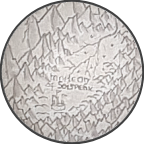
More about Mitra
Social: Some clans, mostly the fishing and hunting ones in the east and north of Mitra, can be quite friendly and will actively seek to invite you to their midst for partying and storytelling, their Nomadic and isolated lives gives them a craving for the input of outsiders. In Ogden, Gannet and Emberbluff and many of the northern villages, strangers are more than welcome and one might find these people very hospitable and sociable. On the other hand, approaching any of the mining clans or or the religious groups from the Sol Cult, is an dangerous if not suicidal. They do not tolerate strangers and your persona and whereabouts will be known to all clans as soon as you enter their demesne. They are always suspect, and if you come all this way to see Mitra your intent can't be pure, they reckon. Outsiders are by all purposes and intent treated like thieves or heretics. It is said about south Mithran hospitality, it's "like a splendid picnic on a volcano. You love the food and the view, but you'd just as well be some place entirely else".
Mitra has ties to Passar and Lebre, the latter is actually called Mitran Lowlands when you speak to the locals. Social exchanges are not uncommon and marriages across the three regions are not uncommon. The Mitran's prefer being left alone and marrying their own, but they are quite aware of inbreeding and the problems it causes, the marriages across regions ensure influx of new genetic material.
Geography: To the west, the land rises into the Central Mountains, dry, jagged and bone breaking territories that produce sturdy people, all hills and naked mountains. It's a lifeless landscape at first glance but it is rich for those who know where to look. The Mitrans have dug far into the mountains and mineshafts and entrances litter the mountainside. To the east and north the mountains and hills give way to old forest and rich farmland stretching all the way into Lebre. The land is divided by the Solspeak River, which empties into the North Sea. The river provides rich and fertile wetlands and is also known as the Blacken River, to everyone else but the Mitrans.
Military: Nothing local as there are no borders to patrol, but Mitra delivers to the Alliance conscription needs and also has several warrior clans solely specialising in war, most of them stationed at the Great Wall of Mitra and some of them stationed in the garrisons on the Whispering Rapids. They also deliver heavy infantry, weapons and metal armour to the war effort.
Trade: Not much trade is going on. Regular shipments of ore, metal and gemstones travel to Passar or Eila destined for the North Sea trade routes but nothing much goes into Mitra by means of trade, they are ever suspicious even of their neighbours. Their self-reliance and ability to produce everything locally makes their need for trade minimal.
Religion: There is one dominant religion called the "Mithran Sol cult" that has its origin and temples deep within the central mountains. A secret and holy place of worship that the Mithrans would defend with their lives, a place of which they never speak to outsiders or people of lesser trust. Everyone involved with the cult will make several journeys into the Solspeak Temple City as pilgrimage, but the rituals have never been documented and the legacy of the cult is verbal only.
Magic: Far into the Central Mountains there are still beings and creatures of magic. Pilgrims to the Temple City or returning from it do disappear from time to time, there are things better left alone in the mountain caves. A rather exotic but unconfirmed rumour claims that an ancient magical being lives and is indeed the foundation of the Sol Cult, but most likely just a rumour started by the cult to keep the curios at bay. The Mitrans are well aware of the dangers and they aren't explorers by nature so they don't go into the mountains they dig under them. In all other places of Mitra magic is no longer visible nor does it play any role in the life of the Mitrans.
Passar
Relatively easy going forest people, usually hospitable and friendly enough to any one outsider. The nature around Passar treats its inhabitants well and they in return share the abundance. Passar also serves the very important function of being the food supply for Avarice as well as Passar itself, the dwarves in the mountains only care about digging for riches so Passar feeds them, clothes them and entertains them in return for gemstones and metals from the mountains. There isn't much activity going on in the mountains, the mines south of Bregado and in the Miroca Pass are all run by their neighboors in Avarice and the people of Passar prefer the woods and open land. The ruling city of Keli lies in Passar, it isn't really a capital, more an administrative center but if you are looking for a fun and a good time in the Revian Alliance Keli is the place to visit. Slightly North lies the Keli Retreat a luxurious mountain dwelling, make sure you bring enough money. To west of Keli lies the Ruins of Eiwalla, definitely worth a visit if you are interested in history.
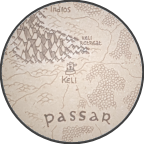
More about Passar
Social: The people of Passar are a lively and hospitable lot. The weather is mild and tempered where the great forests lie in slumper at the foot of the Central mountains. Here the wildlife is abundant, in the summer season the nomads and fishermen travel to their territories and forests near the enormous North Sea and when the winter seasons start, they return to the foot of the mountains, enjoying the protection and milder climate while the North freezes over. Most of these nomadic tribes are well beyond hospitable, if you can find one, a stark contrast to the people in the west. But the abundance of food and richness of their land makes sharing easier, and any outsider that is lucky enough to run into any of the nomadic tribes of Passar will be in for a treat. Someone returning from the harsh lands of Mitra and happening across such a tribe, would not think them the same people.
Geography: In the south the land stretches into the Central Mountains, there are a few mines but the hunters of Passar have no interest in digging. The mountain cities of Bregado and Picokeli are used as winter residences for the nomadic tribes. From those southern mountains a huge forest stretches far into the north and into Eila, and reaches all the way to the shores of the North Sea covering most of Passar and Eila. In the east and to the North, great rolling plains cover a vast area, perfect for farming and for feeding Passar itself as well as the hungry mountain dwellers from Avarice.
Military: Major contributors in conscripts, mostly archers, light infantry and leather armorings. Together with their northern neighbours in Eila, Passar builds and maintains most of the fleet on the North Sea, not so much for defence but just as much a means to move troops quickly. Travelling from the northern borders to whispering rapids would take footmen at least 6-8 weeks while the same journey could be made by ship in one week.
Trade: An old network of trade routes and tradestations runs through the forest allowing the forest people to trade with Avarice and Eila. Trade with Mitra to the west is rare, but the Mitrans are fond of Passar’s leatherworks, and there is a large fur industry and trade in Coalgate.
Religion: Some shamanistic beliefs and rituals, there are lots of small shrines in the forest where the people make sacrifices, but religion appears to play no major role in life.
Magic: None
Eila
Contrary to the neighbours in the south the clans from Eila are strictly nomadic. Travelling either around the great forest or up along the North Sea to fish and hunt, they follow the flow of the seasons. They stand slightly taller than most folks in the region making them more fit for hunting and hiking and tackling the rough nature this far north. The groups are family based, led by an elder, but lots of exchages takes places between the groups to minimise inbreeding. Strangers in Eila may enjoy the citylife in Omaru or Evonhaast famous for their Inns and Taverns or find passage to the North in Kurowe where the trade ships set out on the North Sea.
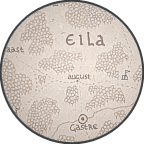
More about Eila
Social: The nomads are not very sociable at all, most groups will avoid contact with strangers if they can. They are not hostile in any way and one can find passage safely enough through Eila as long as you don't bother the locals. In the cities especially the larger ones, strangers will find themselves much more welcome. In the large cities of Evonhaast and Indios, you can find anything from brothels to temple, while the smaller towns of Gastre and Paringa, offer more cozy and innocent surroundings, strictly speaking, the place you can take the whole family and not get in trouble.
Geography: Eila is covered in forest all the way to the North Sea and all the way to Lebra in the north east. At the forest edge in the east great rolling plains form enormous expanses of green, but a territory mostly uncultivated by Eila. They stick to the forest and leave farming to Passar.
Military: Contributes largely to the alliance army, mostly archers, horsemen, artillery and leather armour. Selected young and able men from each clan go through at least 1 year of military training. Together with their southern neighbours in Passar, Eila builds and maintains most of the fleet on the North Sea, allowing military transports across the North Sea.
Trade: An old network of trade routes and tradestations runs through the forest allowing the forest people to trade with Passar and Lebre. The trade routes are connected to Kurowe where the Trade ships set out to cross the mighty North Sea. Also in Kurowe military equipment is shipped through the Ildebrail Strait to forward Revian 3.rd and Revian 4.th garrisons right on the whispering rapids. This allows the alliance to quickly shift material and armys from the Great Wall of Mitra to the front lines at the Whispering Rapids, depending on where the threath is greatest.
Religion: Some shamanistic beliefs and rituals, there are lots of small shrines in the forest where the people make sacrifices, but religion appears to play no major role in life.
Magic: None
Avarice
Travelling further south, to the outer frontiers of the Alliance, we find the proud and industrious people of Avarice. The dwarves that live here have made it their main industry and sole purpose in life to mine the mountain, all of it. Where Passar is the foodstore of the alliance Avarice is the trasure chamber
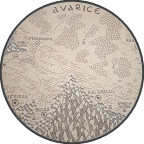
More about Avarice
Social: The dwarves here have dug an entire city of strongholds into the mountain side and are forever digging further in, their dream is to one day emerge on the other side of the Central Mountains and trade directly with the Elexian Empire and the really rich people of Medera and Olearia. North of the dwarven hold the land gives way to large lush and open forest, rich in wildlife berries and roots, but the dwarves in the mountains are not farmers. Instead they trade with the forest people of Passar for all their basic needs, unlike their cousins from Mitra they are completely reliant on outside help for their daily needs.
Geography: Mountains and hills, pretty much sums it up. Most of the gust has been taken out of the Northern winds as it reaches the mountains in the south often dropping lots of rain in the area and giving the dark mountains a green lush look covered in mosses and grasses. The only ones unaware of the beauty of the mountains are the dwarves from Avarice, they only care for what is inside and under the mountains. Despite its favourable and mild weather the ever present hills and protruding bedrock formations makes the land unsuitable for farming of any kind.
Military: Avarice supplies the fewest conscripts in the Alliance, and they are in comparison not really all that fit for war. In return they produce the finest metal weapons and armour in the North only surpassed by the ones made in Ophaele on the other side of the mountains.
Trade: With Passar exclusively, metals, weapons, armors and gemstones for daily necessities.
Religion: None that we know off.
Magic: None, the magical beast that once retracted into the mountains has left for other planes long ago. The dwarves are busy around the clock breaking down the mountain and no sane being would stay in that kind of noise.
Lebre
Far to the north we find the region called Lebre. If you ask the Mitrans they call it Mitra and the good people of Eila consider it as part of their backyard, but the people in the region are from Lebre if you ask them. There are no real borders within the alliance only towards Llaene and Sabro'tir Wildlands, so it's all a bit fussy, but Lebre is officially recognized within formal agreements, but most people don't care. The region is small and supplies both Mitra and Eila with farming products grown in the river deltas of the Blacken River.
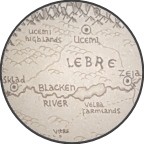
More about Lebre
Although they live under and near the mountains the folks from Lebre are farmers, through and through. The river delta around the Blacken river contains rich soil deposited from the mountains over the centuries and the great rolling plains in Velba Farmlands and Zeja Plains are equally rich and fertile. With the mountains providing shelter from the Northern winds the land can be cultivated from early spring to late autumn. This is the real soup kitchen of the Alliance.
Social: Very social people, it is indeed hard to believe they share territory with Mitra and Avarice, even the forest people from Passar and Eila will appear arrogant and uptight in comparison. They are straightforward, hard working and all together good people, it is quite possible that the people from the region originate from Baros'tir Wildlands or even Further away their good spirit certainly isn't typical for the region.
Geography: In the North Lebre lies in cover of the mountains protecting it from the harsh northern winds. To the south a river delta formed by the Blacken River provides rich farmland. To the East Blacken River empties into the North Sea and the landscape opens up to the north into what is known as Baros'tir Passage. To the West the farmland and great rolling plains gradually fades away into the Central Mountains.
Military: Lebre sends few conscripts but makes up for the deficit in horses and supplies. Some of the fiercest and strongest war horses are trained in Ucemi highlands, north of Sklad.
Trade: With anyone that wants it. Lebre is rich in farmproducts, anything that can be grown they will grow. Traders go outside Lebre or come to the lands exchanging farmland products with fur, leather and metals.
Religion: Their faiths have more in common with the Baros'tir religions than anything in the alliance. They are not hugely religious but those that are, pray to local gods of sacrifice.
Magic: None